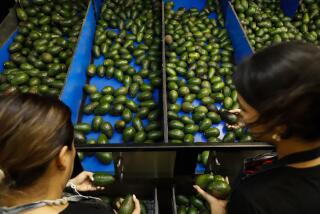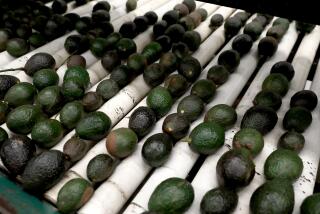Gil Henry dies at 88; revolutionized avocado industry
- Share via
The Aztecs gave us guacamole, but it was Gil Henry who gave us avocados that don’t have to sit on the kitchen counter for weeks to become dip-worthy.
Until the early 1980s, avocados were green, rock-hard objects that could take many days to ripen once shoppers brought them home. But then Henry pioneered a “ripening room” on his family’s avocado farm in Escondido that sped up the process, allowing supermarkets to sell avocados that are ready to eat or close to it.
The method has since become the industry standard.
“It was revolutionary — no question about it,” said Tom Bellamore, president of the California Avocado Commission. “In terms of building demand, it had a tremendous impact.”
Henry, whose innovation helped establish avocados as day-to-day sandwich and salad fare instead of a novelty reserved for Mexican restaurants and Super Bowl Sundays, died May 18 at his avocado-shaded home in Escondido, family members said. He was 88 and had non-Hodgkins lymphoma.
He was the son of Florence and Charles Henry, avocado growers in a day when the fruits, still madly exotic, were known as alligator pears — a term poorly translated from Nahuatl “that ought to be frowned out of use,” The Times said in 1902.
As a gardener on a Bel-Air estate, Henry’s father was impressed by the avocados he tended and planted his first grove, on land he purchased northeast of San Diego, the year Gil Henry was born.
Charles Gilman “Gil” Henry was born in Los Angeles on Jan. 29, 1925. He pitched in at the family’s ranch “from the time he could walk,” said Phil Henry, Gil’s cousin and president of Henry Avocado Corp. “He was born into it and grew up with it.”
Except for an Army stint from 1942 to 1944, Henry worked in avocados well into his 80s, showing up before sunrise each day to unlock the gates at the company’s Escondido headquarters.
In 1953, his father died in a tractor accident. Gil took charge of the company’s packing and marketing while his younger brother Warren oversaw the farming operations.
Growers had long known about consumer resistance to unripe avocados but for Henry, a hidden camera in a California supermarket in 1983 underscored the problem. Paid for by avocado producers, the footage captured shoppers as they tried to squeeze the hard fruit, put it back in the bin and moved on down the aisle.
“This film clearly demonstrated that countless sales were lost,” Henry told a California avocado workshop in 1984. It “was the catalyst that motivated the Henry Avocado Company to start the controlled ripening process.”
With the help of a consultant named Vic Tokar, Henry adapted methods long known to trigger the ripening of bananas.
His company built the first forced-air cooling room for avocados, pumping in minute amounts of ethylene, a gas naturally released by fruit during ripening. The arrangement allowed avocados to ripen quickly and uniformly.
“The need is evident, the method is available, and the tests are convincing,” Henry told the workshop.
Traveling to drum up support, Henry pitched the concept to grocery-chain produce managers such as Mike Aiton, then of King Soopers in Denver.
“Gil was extremely passionate about what he did — not just for his company but for the industry,” said Aiton, now marketing director of Prime Time International, a Coachella produce firm. “The intriguing thing to me was he didn’t really care if we bought his avocados — he just wanted us to sell more avocados.”
Today, avocado ripening facilities are located throughout the U.S., processing billions of pounds of fruit from California and elsewhere before they are shipped to nearby supermarkets.
The San Diego County Farm Bureau named Henry farmer of the year in 2007. In the 1960s, he was a founding member of the California Avocado Advisory Board, the forerunner of the current avocado commission.
Henry is survived by his wife, Georgia Kelso Henry; five daughters, Adrienne Henry, Gwynne Henry, Annette Henry and Denise Villaseñor, all of Escondido, and Stephanie Dunn, of Estacada, Ore.; son Hudson Henry of Las Vegas; 10 grandchildren and eight great-grandchildren.
Family members said he liked his avocados sliced on toast with salt, pepper, lime juice and Tabasco sauce.
More to Read
Start your day right
Sign up for Essential California for the L.A. Times biggest news, features and recommendations in your inbox six days a week.
You may occasionally receive promotional content from the Los Angeles Times.







